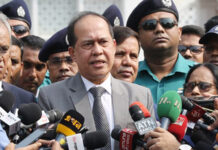US Ambassador in Dhaka Dan Mozena on Saturday hoped that Bangladesh will seek to join free trade block – Trans-Pacific Partnership (TPP)–saying it would give a ‘huge boost’ to Bangladesh exports.
“I believe joining TPP would promote Bangladesh as a huge player in the global market — pharmaceuticals, finished leathers, jutes and many other items…Bangladesh would be able to take full advantage using demographical dividend as millions of young Bangladeshis enter into their productive years,” he said.
The US diplomat hoped that the government of Bangladesh, business bodies, and the civil society would rigorously explore possibility joining with the TPP. “It’ll help Bangladesh become a middle-income country.”
In cooperation with the US embassy in Dhaka, Centre for East Asia Foundation organised the seminar, titled ‘United States-Bangladesh Relations with Special Reference to Security in the Bay of Bengal’ at Brac Centre Inn in the city.
Chaired and moderated by former ambassador M Humaiyun Kabir, the seminar was attended, among others, by former education minister Dr Osman Faruk, DG of Bangladesh Coast Guard Rear Admiral Kazi Sarwar Hossain, security analyst Brig Gen (retd) Shahedul Anam Khan, senior journalist Sadek Khan, Chinese ambassador in Dhaka Li Jun and the Spanish ambassador.
Dr Atiur Rahman of Dhaka University’s Political Science Department presented the keynote paper.
Mentioning Bangladesh’s maritime boundary win against Myanmar, the US envoy said Bangladesh like America is a maritime country and the countries’ economic wellbeing is highly dependent on seas.
Most of Bangladeshi exporters use the sea to export to America, Europe and other points round the world and similarly the Bangladeshi importers use the sea, he added.
As Bangladesh seeks to protect the Bay of Bengal from terrorism, piracy, trafficking and robbery, America helps it to enhance special force capacity in the maritime domain, Mozena said.
He also said Bangladesh should enhance capacity to protect maritime resources and form a special force for the maritime domain.
Responding to a query on Rohingya issue, he quoted President Obama as saying the solution to Rohingya situation lies in Myanmar. “We’ve made clear the US policy that the solution to the problem of Rohingya lies in Myanmar. We also called upon the government of Myanmar to ensure that humanitarian assistance to Rohingyas.”
Replying to another query over US base in the Bay of Bengal, he said, “No more talk about that in other region outside Bangladesh.”
Asked whether the US should play a moderator’s role in solving the ongoing political crisis in Bangladesh, the US envoy said Bangladesh is a sovereign country and it should do what is good for it.
Mozena said the US-Bangladesh partnership is at its all-time high. “The relationship and partnership between America and Bangladesh has never been deeper, broader and stronger than it is at this moment.”
He said transpacific partnership round ended in Brunei which is a proposed free trade agreement that would faster Asia Pacific economic integrity by facilitating greater trade and investment among its members.
Osman Faruk who focused on political issues said the peaceful transition of the government is now more important than any other issues.
Mentioning ‘conquer of the sea’, he said, “It’s definitely a beautiful side. But come October, the big problem how the transition of the government in a peaceful way is more important than conquer of the sea.”
Prof Ataur Rahman, in his keynote paper, said Bangladesh has a coastline of 220 nautical miles. The maritime boundary dispute with Myanmar has been resolved by the International Tribunal for Law of the Sea judgment on March 14, 2012 in which Bangladesh and Myanmar were awarded 111,631 and 171,832 square kilometers respectively.
However, the disputes with India remain unresolved, which are expected to be disposed of in 2014.
In 838,600 sq mile-area of Bay, security threats of the littoral states, including Bangladesh ,range from disputes over exclusive economic zones to terrorism, piracy, poaching, over-fishing, and trafficking of humans, arms and narcotics, US security ties with Bangladesh get salience in this context.
The US realised that Bangladesh adjoined by the Bay in the Indian Ocean should not be totally under either the Indian sphere of influence or that of China. So, US security assistance programme can have tremendous impact on supporting states like Bangladesh trying to build their security capacity, he added.
Source: UNBConnect










